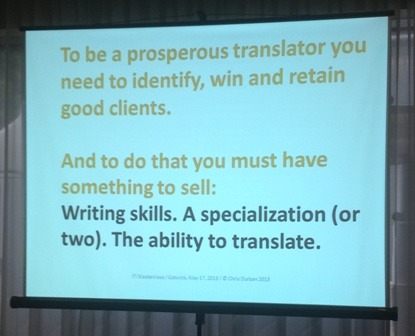Working the Room Tips by Chris Durban
By Catherine Christaki
Reblogged from Adventures in Technical Translation with permission from the author (incl. the image)
 During the ITI conference in Gatwick in May 2013, I had the privilege to attend Chris Durban’s Working the Room masterclass.
During the ITI conference in Gatwick in May 2013, I had the privilege to attend Chris Durban’s Working the Room masterclass.
Chris always offers numerous great tips about generating leads and finding direct clients. She inspires her audience to be and look more professional and better marketers. Below you’ll find some of the pearls of wisdom she shared during the masterclass.
Required skills for translators
- Writing skills. A specialization (or two). The ability to translate.
- Marketing skills to be able to identify and approach good clients.
- Invest in specialization and be/get passionate about your projects.
- Don’t start looking for direct clients right out of college. Get some experience first, translating, revising, working with colleagues.
- Speak your client’s languages fluently and write it well too (invoices, pitch etc.)
- Read the business press and specialized magazines/journals, as well as your colleagues’ blogs
Before contacting potential clients
- Make sure you are up-to-date about their industry; the terminology, the technology etc.
- Research the company and identify key people using industry publications, their websites and social media
- Read up on the person you’re planning to contact before meeting them.
- Potential good clients are passionate about what they do.
- SMEs are easier to approach than big companies.
- Be prepared to invest time and budget, this is a long-term project.
Attending conferences/events
- Training events are also marketing events. Pick your events carefully.
- Find out which events your potential clients are attending.
- Dress the part and carry professional business cards.
- Prepare and rehearse your elevator speech.
- They must think you are one of them.
- Use the Q&A part in presentations. Identify yourself quickly and ask a pertinent question.
- Attend at least a few events per year; practice makes perfect.
- Find [target language nationals] in international client events, they’ll be more open to talk about translation issues.
How to approach clients in events
- Listen carefully to what they’re saying.
- Never start with “Hi, I’m a translator, do you need anything translated?”.
- Be friendly and positive. Never be negative about our profession with clients and don’t complain about bottom-feeders, competitors and CAT tools. When they ask “Do you make a living being a translator?”, say “Absolutely and my clients/texts/projects are super important etc.”, nothing negative.
- Start with a nice comment as the ice-breaker; thank the organizers for a fabulous day/event etc. when talking/asking a question.
- Express genuine interest about the industry.
- To start up a conversation ask: “What did you think of the speaker?”, “Which presentations did you like best?”.
- After you get them talking about themselves, go into business mode: “Do you export to [X]?” “Do you have any documentation in [language Y]?”
- Other examples to get them to talk about translation:
- “I just started to specialize in your industry which I find fascinating. Can you recommend events I should attend in 2013?”
- “I see your company specializes in [X]. Based on texts I’ve translated recently, some of my clients need those services; can I give them your name?”. Don’t mention your clients’ direct names; your work is confidential.
Few more tips
- After meeting potential clients: Send email to people you met with terminology questions, things you were talking about.
- When quoting prices: The right price is not when they agree immediately; they should wince first (otherwise your price is probably too low). If they tell you “That’s expensive”, reply “But it’s worth it” or don’t say anything.
- Educate clients: Explain that language services are a long-term investment rather than a quick fix
Chris also talked about the rationale behind translators signing their work. Check out her interview in Catherine Jan’s blog: To sign or not to sign? Chris Durban strikes again.
You can also read the German translation of this post by Alain Rosenmund.

I have shared this on the private virtual community of the ITI Italian Network and linked to this blog. Thanks!